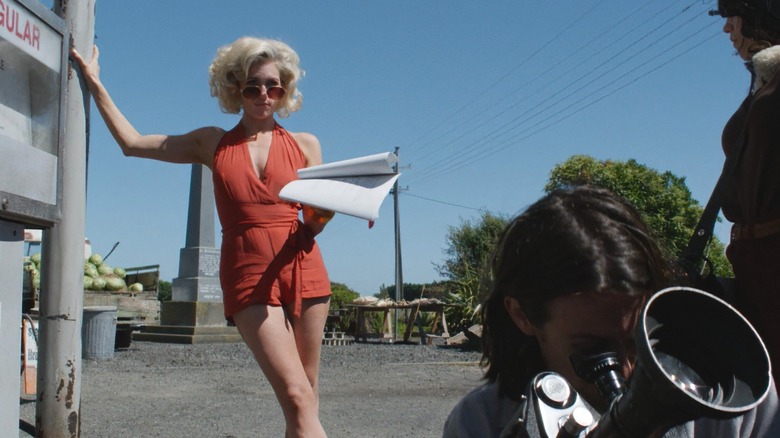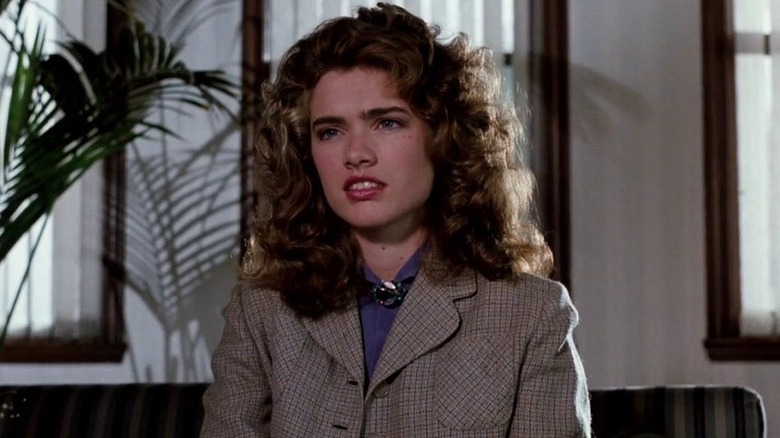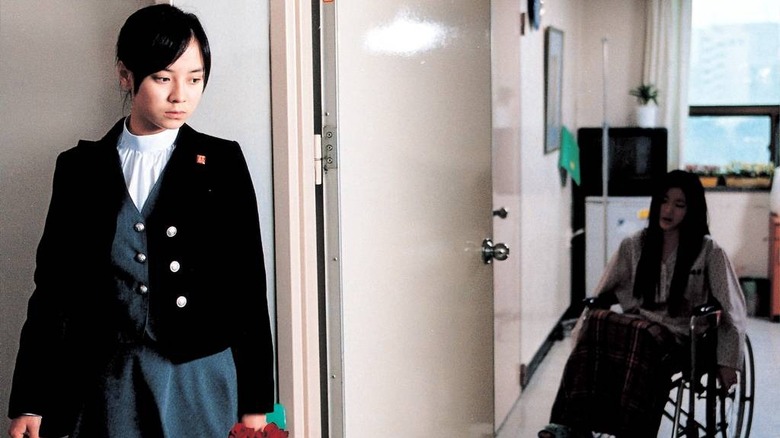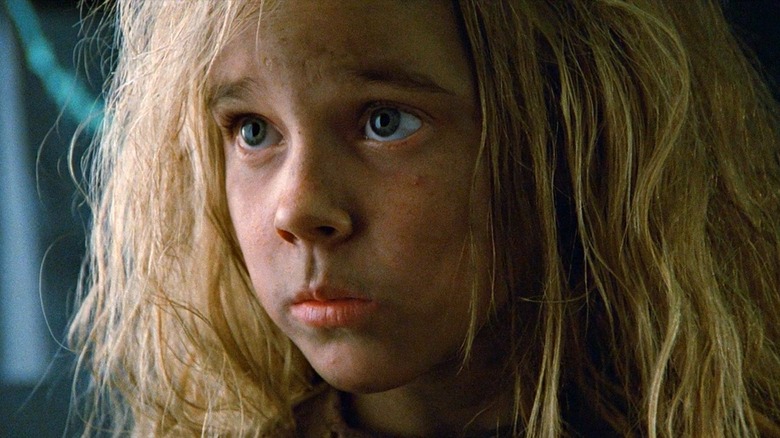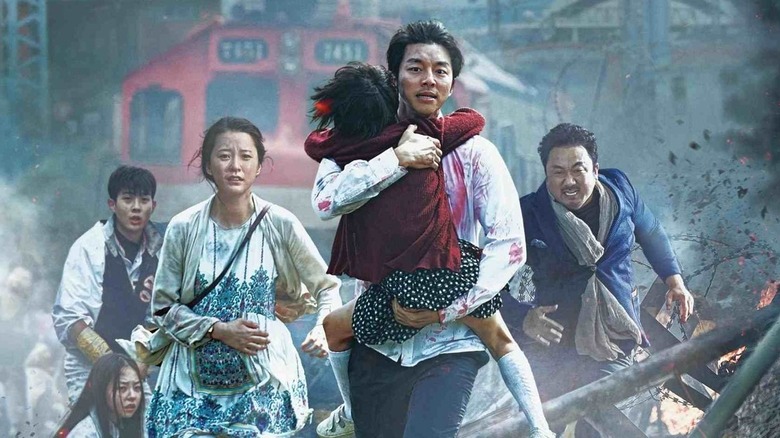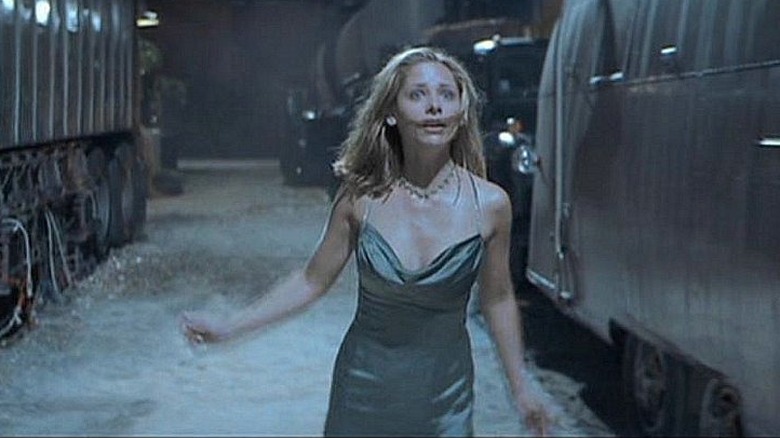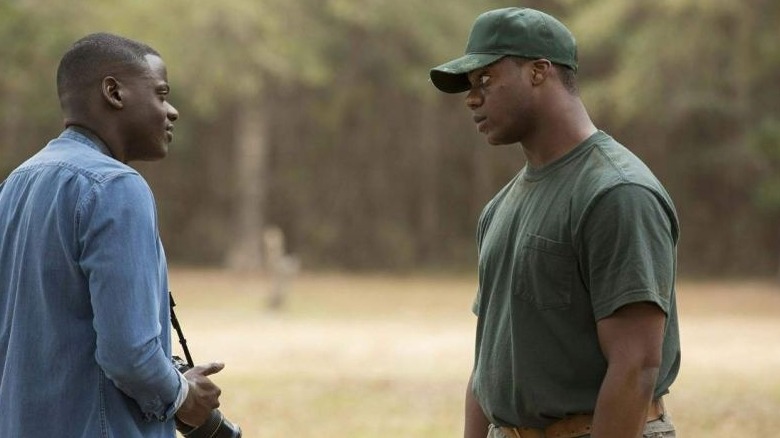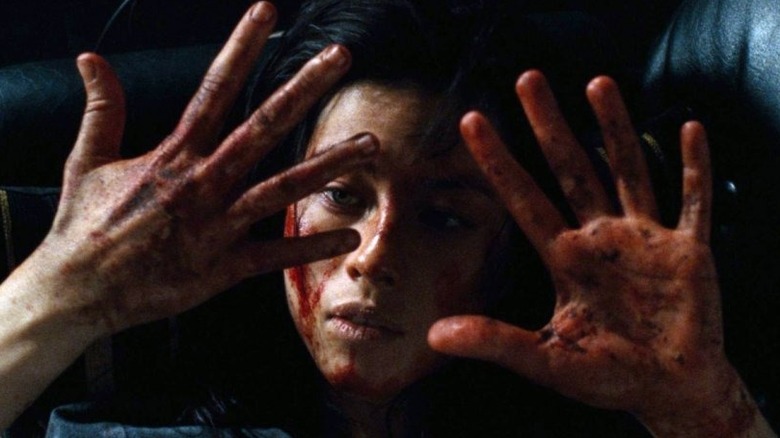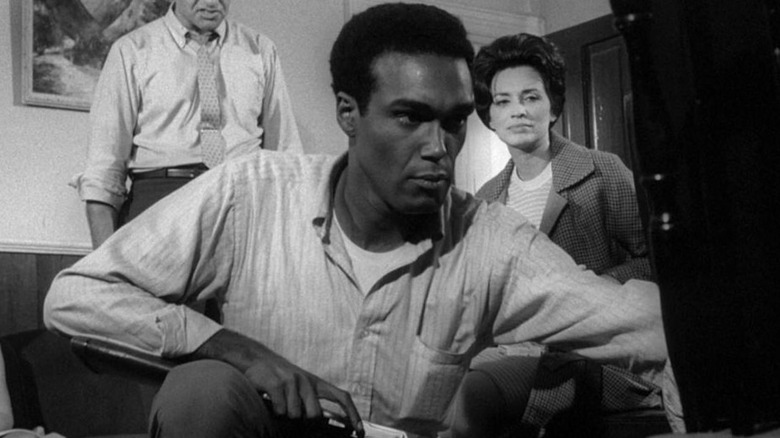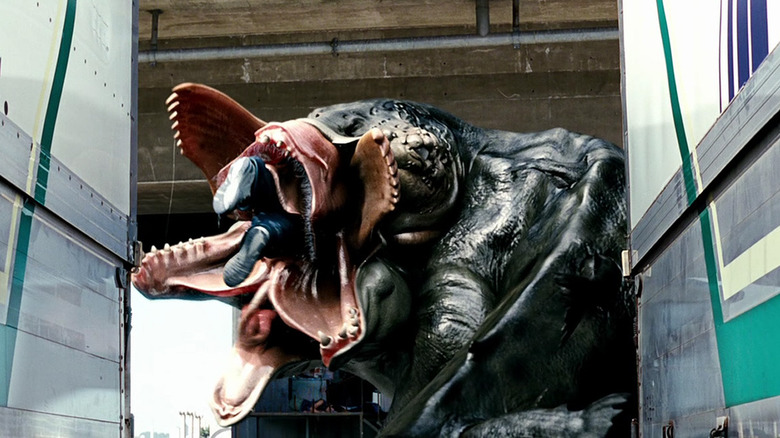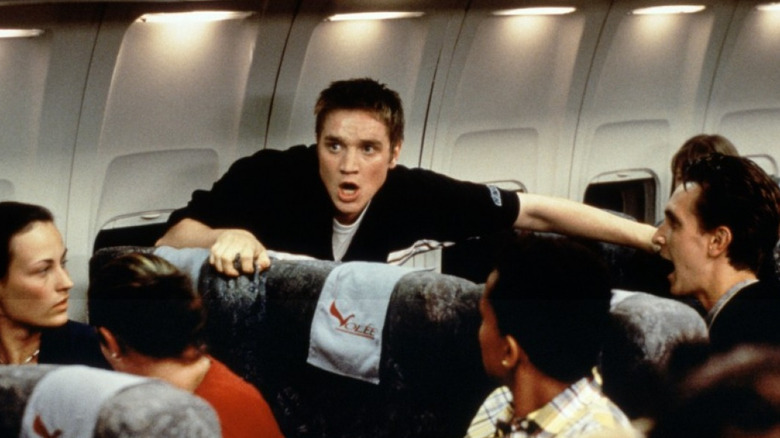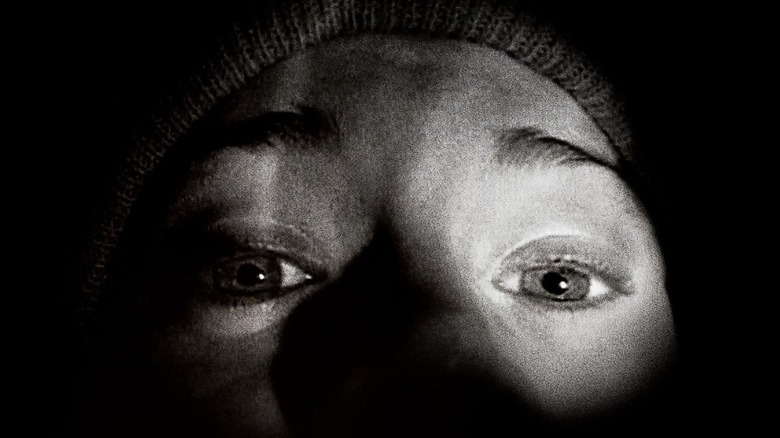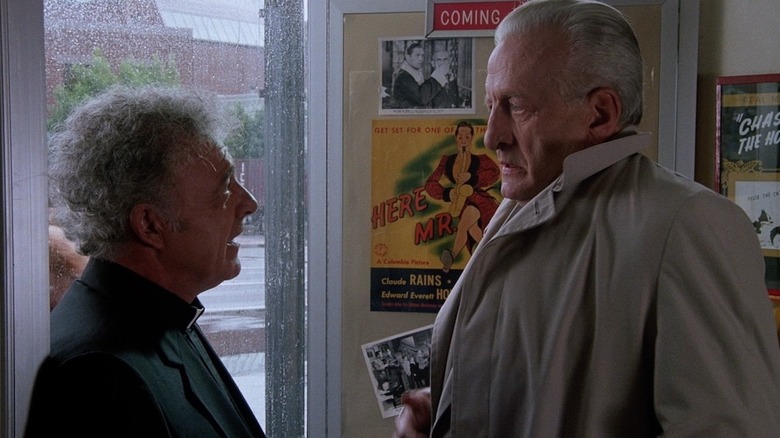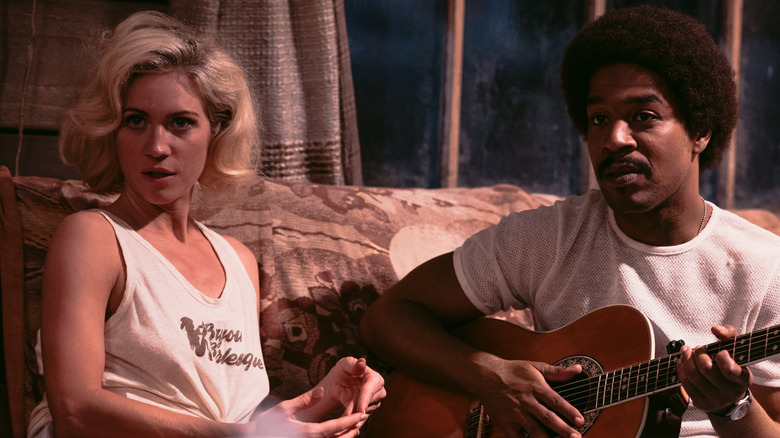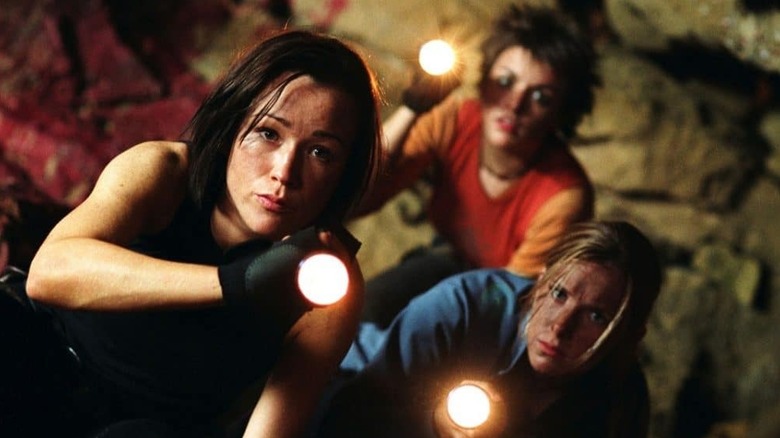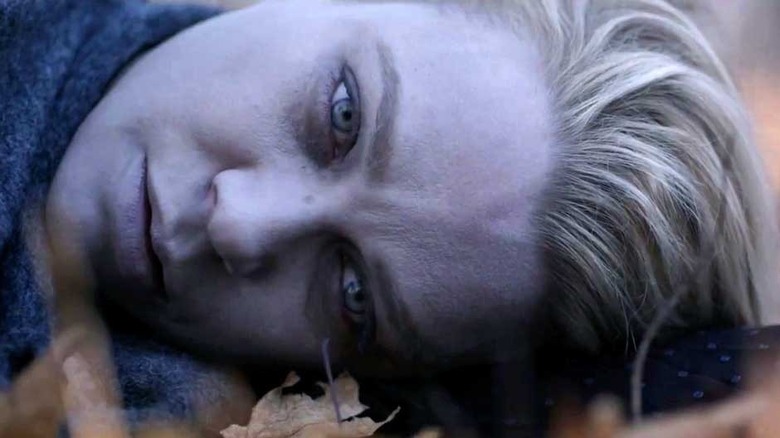The Saddest Character Deaths In Horror History
Horror is a genre known for killing its darlings. However, it still doesn't take away the sting when a beloved horror character bites the dust. In a genre full of carnage and unexpected betrayals, what qualifies as a memorably sad death? For some, it's when a character dies far too soon in the run-time, robbing the audience of a chance to see them contribute meaningfully to the story. For others, it's when a character has escaped dire odds only to be slain in the final act, oftentimes for shock value. Perhaps the hardest-hitting deaths are the ones that aren't a shock at all to viewers and are actually necessary milestones for the protagonist to experience before proceeding to their next chilling chapter.
When it comes to franchises, this topic gets even dicier. The rules for who should survive or not in horror sequels are often overruled due to casting availability and a creative team's desire to take a beloved film (or films) in a new direction. Here are some of the saddest deaths in horror movie history that still leave fans with lingering feelings of dread and wonder.
Nancy Thompson's Death in A Nightmare on Elm Street 3
Heather Langenkamp's Nancy Thompson is one of horror's most iconic final girls. Whereas the prior era of '70s slashers often pushed women characters into flat roles that lacked agency, Wes Craven's "A Nightmare on Elm Street" showed 1984 (and the genre's future) what could happen when you give power to your female characters to fight against the monsters in this world. Nancy did more than run and scream; she plotted, and she won.
When Nancy returned in "A Nightmare on Elm Street 3: Dream Warriors," fans saw that not only did Nancy survive the shocking ending of "A Nightmare on Elm Street," but she has a stellar career in dream psychology. She channeled her experience into helping others, positioning herself perfectly to assist Kristen Parker and her friends to defeat Freddy Krueger. Nancy coaches the ragtag group in Westin Hills Psychiatric Hospital on dream combat and defense skills — which doubles as a gorgeous metaphor for trusting what young people say and giving them the tools needed to heal from trauma.
However, Nancy dies in the film's final act when Freddy tricks her with some of her unresolved pain. Still reeling from the guilt of losing her father, Nancy embraces a dream vision of him, only to be stabbed to death by Freddy. After watching Nancy mentor Kristen and prove that people are stronger than their fears, it's heartbreaking to watch Freddy use Nancy's empathy as his ultimate weapon.
Kim So-hee's Death in Wishing Stairs
Directed by Yun Jae-yeon, "Wishing Stairs" is a movie overflowing with tragedy. Each and every death in this film is harrowing as they're all based on misunderstandings or half-truths that lead young people to make drastic choices, assuming they're protecting their fiscal futures. "Wishing Stairs" examines what happens when a group of young girls at a girls-only arts school feel pressured enough to compete with each other, no matter the cost. Out of all the lives lost in this film, it's Kim So-hee's suicide that's the hardest to stomach.
So-hee and Yun Jin-sung are best friends studying ballet. While the film calls them friends, "Wishing Stairs" works best when read as a queer romance. At one point, Soo-hee confesses that all she wants is to dance with Jin-sung and be her prince. But, Jin-sung secretly desires to be the best ballerina and beat So-hee, who naturally is more talented than her and genuinely loves dancing. Jin-sung finds a flight of magical stairs and wishes to be the best in class. After So-hee gains the one slot to attend a Russian ballet school, Jin-sung angrily pushes her, accidentally causing her to fall down a flight of stairs. When Jin-sung learns So-hee won't be able to dance again, she apologizes, but the betrayal(s) from someone she loved most leads So-hee to take her own life.
If you or anyone you know is having suicidal thoughts, please call the National Suicide Prevention Lifeline at 1-800-273-TALK (8255).
Newt's Death in Alien 3
In James Cameron's "Aliens," we learn not only has Ripley been in stasis for 57 years, but during this time, her (surprise) daughter Amanda died. Soon, the Weyland-Yutani corporation asks for her help to check on a terraforming colony named Hadley's Hope. It's there Ripley meets and vows to protect Newt from a barrage of xenomorphs, channeling her maternal grief into caring for a child she can save. By the end of the film, Newt calls Ripley "Mommy," and the pair, as well as Corporal Hicks, hopefully, trek off to start a new life.
In "Alien 3," writer Vincent Ward decided to scrap this found family unit. While Ward didn't write the screenplay, his initial story idea to kill off Newt and Hicks as character motivation for Ripley stuck. Although the bulk of "Aliens" is watching Newt's quest to survive, "Alien 3" opens with an escape pod crashing. Not only does Newt's death happen off-screen, but she never has a chance to say goodbye to Ripley, making her storyline feel ultimately irrelevant.
"Aliens" actor Michael Biehn suggested that this choice felt out of place with the franchise's established mythos, telling Forbes, "When you think about 'Aliens,' that final third part of the movie is about Sigourney's character, Ripley, saving Newt and my character, Hicks, helping her. To have Newt and I gone when the third one started, I think, immediately turned off a lot of fans."
Seok-woo's Death in Train to Busan
At its heart, "Train to Busan" is about the limited time we have to be present with and for our families. This 2016 hit K-horror film centers on an out-of-touch father named Seok-woo who is more concerned with business matters than raising his daughter, Soo-an. In fact, it takes a rampantly bloody zombie apocalypse to wake him up to the truth that he's been a horribly unobservant father. While he ultimately saves Soo-an and makes it through two-thirds of the film, Seok-woo does not survive the epic zombie chase. In his final moments, he's bitten by a zombie, so he finds a caretaker for Soo-an, teaches her how to operate the train, and throws his zombie self off the train to prevent his daughter from being injured.
In a certain light, this choice can be seen as a heroic death. We watch Seok-woo step up to be a protective and resourceful father. However, he only spends the last few hours of his life committed to this aim. Truthfully, it's not just Seok-woo that saves the day — a homeless man aboard the train plays a vital part in ensuring Seok-woo and Soo-an survive. After the credits roll, and we know that Soo-an safely gets away, we always remember that's the last of her father she'll ever see. "Train to Busan" ends cementing the fact that Seok-woo never got to be the father he hoped he could be for his daughter.
Helen Shivers' Death in I Know What You Did Last Summer
Seven months after "Buffy the Vampire Slayer" debuted on the small screen, Sarah Michelle Gellar stretched her scream queen muscles in the 1997 teen slasher "I Know What You Did Last Summer." While the horror film hasn't aged well, Gellar's character Helen Shivers certainly has. Compared to the other teens in Kevin Williamson's screenplay (based on Lois Duncan's suspense novel of the same name), Helen is easily the most nuanced. When we meet her, she's just won the Fourth of July Croaker Beauty Pageant and aspires to be an actress.
However, plans get derailed when she ends up being a part of a hit-and-run accident and agrees to cover it up to secure everyone's future. One year later, she's still in Southport, North Carolina, working at her family's store. It's implied she's in a lower financial class than her friends — making college an off-the-table option, further wedging the distance between her and prior high school friendships — and that her acting career hadn't panned out.
When a killer begins taunting the friend group, Helen seems thrilled to help solve the case and be a part of something bigger than being bored working retail. Ultimately, the killer slays her. However, Gellar's chase scene in "I Know What You Did Last Summer" remains iconic because of how heavily it teases Helen's potential survival. Each viewing, you think she just might make it this time, even though we know she doesn't.
Walter's Death in Get Out
By the end of Jordan Peele's "Get Out," viewers learn that Walter's body has been controlled by the Armitage family for decades while he watched from inside his mind's "sunken place." During the film's final moments, Chris escapes the family's grasp and runs into Walter once more. Thanks to Chris' camera flash, Walter regains control of his body momentarily and is able to move on his own accord. Walter chooses to save Chris by killing Rose before shooting himself with a rifle so that he won't be subjected to the Armitage's control anymore.
This moment is hands down one of the most harrowing ones in "Get Out" due to all the unanswerable questions it raises. We'll never know if what the Armitage family did to Walter could be reversed; if it could, what kind of new life would he build for himself? We'll never know if or how Chris would help Walter in return and what that might look like. We'll never really know what Walter's personality was like prior to being kidnapped and enslaved by the family. All we know for sure is that for Walter, once he gained access to his free will again, death seemed like the only viable option to escape the Armitages' family torture.
If you or anyone you know is having suicidal thoughts, please call the National Suicide Prevention Lifeline at 1-800-273-TALK (8255).
Lucie Jurin's Death in Martyrs
Lucie Jurin's story in "Martyrs" is among the hardest to watch from the New French Extremity movement. Pascal Laugier's film opens with Lucie escaping a torture chamber. She finds solace in an orphanage and befriends a young girl named Anna. Lucie confesses to Anna that she's haunted by a demon that attacks her. Anna decides it's her mission to take care of Lucie. Throughout the film, it's easy to root for Lucie and Anna's love for one another, though it's more platonic in Lucie's case than Anna's, as we see Anna's tentative kisses rebuffed on-screen.
Years later, Lucie finds the Belfonds family that tortured her and seemingly murders them all, including their children. She calls Anna for help with disposing of the bodies. Anna comes but is devastated as she thinks Lucie picked a "normal" family to slaughter. Anna secretly tries to help one surviving family member, Gabrielle, escape. Lucie discovers this and kills Gabrielle, an event that spurs her demon to emerge and attack her. Lucie defends herself, but we see from Anna's perspective that the demon isn't real: It's a manifestation of Lucie's survivor's guilt. Lucie kills herself, thinking she's destroying the demon. Anna later learns Lucie was right about the Belfonds, but she never gets the chance to tell her, and Lucie never receives the validation she deserves.
If you or anyone you know is having suicidal thoughts, please call the National Suicide Prevention Lifeline at 1-800-273-TALK (8255).
Ben's Death in Night of the Living Dead
Casting Duane Jones as Ben in George A. Romero's "Night of the Living Dead" was a progressive step forward in filmmaking history. In the 1968 film, Jones was not a sidekick, comic relief, nor the wayward Black person responsible for inspiring a white character to begin their quest. In "Night of the Living Dead," Ben uses his resourcefulness to save humans amidst a town full of flesh-eating zombies. Jones' Ben bucked many damaging tropes for Black actors in the '60s by being a lead, a feat that is still noteworthy in regards to the roles Black actors are cast in today. Sadly, Ben doesn't survive.
When a white and armed rescue troop enters the house Ben's hiding in, they shoot him on sight, assuming he's a ghoul — an ending that unintentionally echoes America's ongoing police (and civilian) brutality against Black lives. While the script never specified a race for Ben, Jones' casting added racial context to the film's choices and especially its ending.
Jones detailed why Ben should die in "Night of the Living Dead: Behind the Scenes of the Most Terrifying Zombie Movie Ever" (via The Wrap), stating: "I convinced George that the Black community would rather see me dead than saved, after all that had gone on, in a corny and symbolically confusing way. Besides, the heroes never die in American movies ... The double jolt of the hero figure being Black seemed like a double-barreled whammy."
Hyun-seo's Death in The Host
Throughout the runtime of "The Host," viewers hope Park Gang-du will save his young daughter, Hyun-seo. Of course, this K-horror film delivers a more somber but still emotionally fitting ending. We do see Gang-du receive a second chance at being a father, but not at all how we imagined we would.
At the start of the film, Gang-du works at his dad's snack bar. He's easily distracted from tasks and not at all responsible. When a monster arrives in the Han River and his daughter calls for help, he arrives in time but grabs the wrong child, leaving his daughter to be swallowed by the beast and vomited into a sewer. Hyun-seo finds a boy in the sewer with her and comforts him. She risks her safety to save herself and Se-joo, which causes them both to be eaten by the monster. When Gang-du finds the monster, he attacks it, and pulls his dead daughter's body — cradling a still-alive Se-joo — out of its mouth.
To honor his daughter, Park Gang-du adopts Se-joo. Afterwards, the film flash-forwards to some time in the distant future where we see Gang-du and Se-joo living a quiet life together. We see the kind of father Gang-du could have been for Hyun-seo all along if he had been more proactive sooner. It's heartbreaking to know that Hyun-seo will never see this mature side of him and that it took her death for it to emerge.
Alex's Death in Final Destination 2
Despite surviving the mayhem of "Final Destination," Alex doesn't live to rival death in future films. Due to Devon Sawa not reprising the role, Alex was written out of the story through an off-screen death that's less than satisfying. In "Final Destination 2," we learn from Clear that Alex died due to a brick falling on his head. While no one can truly escape death in this franchise, the oddity of a random falling brick feels too lackluster for such an attuned (and paranoid) character who coached others on how to cheat death throughout a 98-minute runtime. He'd likely see a brick coming for him.
However, Alex almost died in a much more interesting way. In an alternative ending that's a bit more fruitful, he died in "Final Destination" through incineration, but not before he impregnated Clear. The writers scrapped this ending, so viewers will never know what could have been with a child that was never supposed to be born storyline.
In 2021, Devon Sawa mentioned he's open to returning to the role of Alex if they decide to approach the franchise with a requel-like feel akin to 2018's "Halloween." Sawa told OK! Magazine, "I would like to revisit 'Final Destination' again. I always thought that ship had sailed but now that I've seen the Halloween movies, why not just start another sequel from 'Final Destination 2,' like as if the other [films] didn't happen."
Heather Donahue's Death in The Blair Witch Project
Known as the found-footage film that jumpstarted the subgenre, "The Blair Witch Project" focuses on three filmmakers, Heather, Mike, and Josh, going out into the woods of Burkittsville, Maryland to document local legends. Of the core cast, Heather's storyline and death resonate now as the most tragic.
While the three film their interviews and trek into the woods to find the Blair Witch, aka Elly Kedward, Heather receives more than her fair share of bullying from Mike and Josh. Although she's blamed for getting them lost, it's the frantic Mike who kicks their map into the river and antagonizes Heather. Despite them all agreeing to work on this thesis, Mike blames Heather when Josh goes missing. When Heather finds a bundle of teeth and blood (presumed to be Josh's), she condemns herself for their situation and delivers one of horror's most infamous monologues of all time.
Heather dies virtually alone and without any respect from her team. This is one of those horror movie deaths that shouldn't be changed but the framing around how she's treated up to her death, and her opinion of herself on her deathbed, is what makes it heartwrenching. Heather, the only woman on the project, never needed to be a scapegoat. Her sad fate mirrors that of many witch stories — a woman punished for not being trusted and ultimately doomed by men's fear and need to control the uncontrollable.
Father Dyer's Death in The Exorcist III
Written and directed by William Peter Blatty, "The Exorcist III" works as a direct sequel to the chilling 1973 film that was adapted by Blatty from his novel of the same name. The slow-burn film follows Father Dyer and Lt. Kinderman as close friends who meet each year on the anniversary of Damien Karras' death to memorialize him. While on the surface one can read Father Dyer and Kinderman's relationship as a trauma-bonded friendship, the film takes on a deeper meaning if you view their relationship as an unfulfilled romantic one. After 15 years of friendship, the duo embodies the kind of bickering and knowing silence that feels as nuanced as a decades-long marriage.
Watching them poke fun at each other's magazines or movie snack choices is a delight, which makes it all the more harrowing when Father Dyer is killed off by demonic forces. Although Father Dyer gets a spine-tingling exit in "The Exorcist III," it nevertheless pulls at the heartstrings when Lt. Kinderman finds his life-long companion's body. No one will quite know or understand what Kinderman went through in "The Exorcist" as well as Father Dyer did, making this loss incredibly personal for Kinderman. Father Dyer was the one person he could go to with all of life's unanswerable questions, and Kinderman confided in him more than he ever did his wife. Yet, the duo will never get to face off against evil again.
Bobby-Lynne's Death in X
After six years away from directing feature films, fans weren't sure if Ti West would return to helming horror hits again. Thankfully, he did. 2022's "X" pleased both critics and viewers alike due to its unabashedly bloody and emotionally driven story. Made as a pitch-perfect '70s slasher homage, the film focuses mostly on Mia Goth's Maxine facing off with Pearl, delivering a layered commentary on beauty, aging in America, and sexuality. However, it's Brittany Snow's Bobby-Lynne that steals the show. From the second Bobby-Lynne swaggers onto the screen in "X," she commands the room. She flaunts her filmmaking knowledge to the crew helming their adult film. She showcases a strong sense of self, confidence in her sexuality, and loves to challenge those who undermine her.
She's no match for the jealous Pearl, though, who unceremoniously corners her at night and pushes her into the mouth of alligators. Her death is brutal, even if we don't see it, thanks to the dark and murky waters. Before she dies, there's plenty of intriguing moments between Bobby-Lynne and Maxine Minx in the film. But Ti West takes a traditional final girl approach, only letting one of the cast members survive the gore-soaked ordeal. Still, this won't stop fans from wondering what a possible Maxine Minx and Bobby-Lynne team-up could have been like in the film's final act. Who knows? Maybe Bobby-Lynne outwitted the gators too and will return one day.
Beth's Death in The Descent
Written and directed by Neil Marshall, "The Descent" delivers enough claustrophobic scares for a lifetime. Of all the creepy films set in an underground space, "The Descent" terrifies due to its intuitive ability to know exactly how much darkness is needed to set a shot while never obscuring its characters or essential plot details. Plus, its monsters are horrific. The movie follows a group of tight-knit female friends, who set out on a thrilling adventure to deepen their bond. However, Sarah, who was once closer to them, feels distant due to the semi-recent and sudden death of her husband and daughter. Once their spelunking travels begin, life-altering secrets emerge.
Through it all, Beth remains an ally to Sarah, looking out for her at every twisted turn. As the screeching (and hungry) monsters surface in the cavern, tensions are on edge. Their thrill-seeking friend Juno, who got them all into this predicament in the first place by lying about where they were going, accidentally stabs Beth. Shocked, Juno leaves Beth to bleed out alone in the cavern — and likely to distract the monsters as bait. What follows next is Sarah discovering a pleading Beth, and Sarah agrees to mercifully kill her. If that wasn't hard enough for the still-grieving Sarah, Beth uses her final moments to tell Sarah that Juno was having an affair with her husband before he died. Beth thought only about Sarah up until the very end.
Mrs. Reyes' Death in Pyewacket
Written and directed by Adam MacDonald, "Pyewacket" brings a whole new meaning to the power of teen angst. The 2017 horror film revolves around a young girl named Leah who is still processing her father's death. She starts developing a deep fascination with the occult as a way to channel her rage and grief into something else. Her mother, Mrs. Reyes, can't understand her growing interest in black magic or her gothic friends and decides it's best for all if they move out into the country to start a new life. Mrs. Reyes' sudden decision only drives Leah deeper into her study of the mystic arts.
Leah summons Pyewacket to kill her mother, blaming her for uprooting her life and judging how she copes with losing her husband. Once Pyewacket arrives and starts scaring Leah, she fears that she made a mistake. This pushes Leah to reconnect with her mother, opening up about her grief and realizing she needs her mom now more than ever. But, it's too late. By the end of the film, Leah finds who she thinks is Pyewacket and sets it aflame. "Pyewacket" ends with Leah in a police station, realizing that the only being she burned to death was her mother. Mrs. Reyes' death is the crux of the story as it reminds viewers of how quickly emotional decisions can alter lives forever. As Thomas Browne's saying goes, "Think before you act; think twice before you speak."
